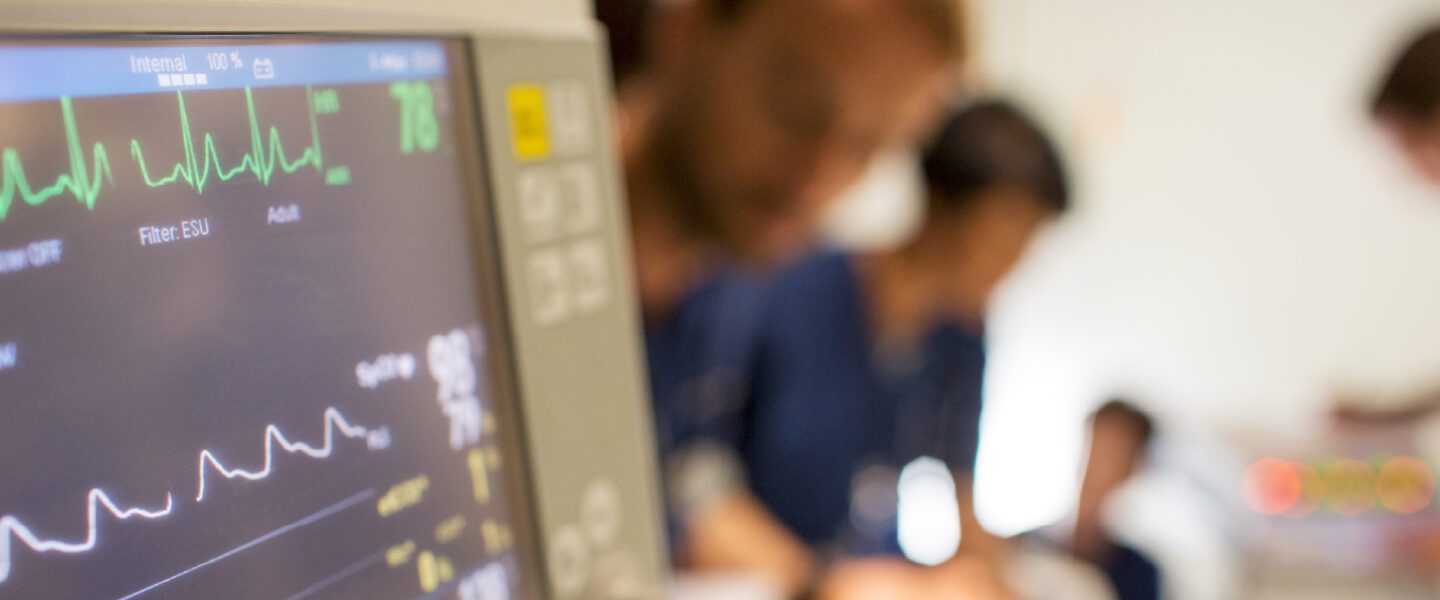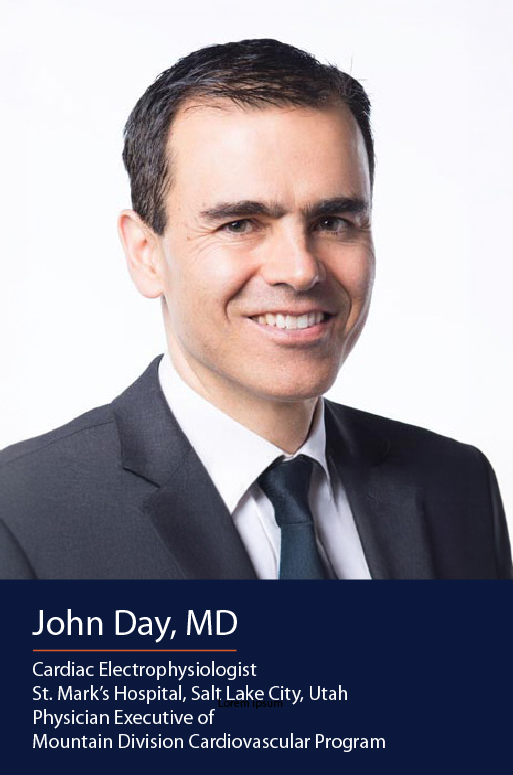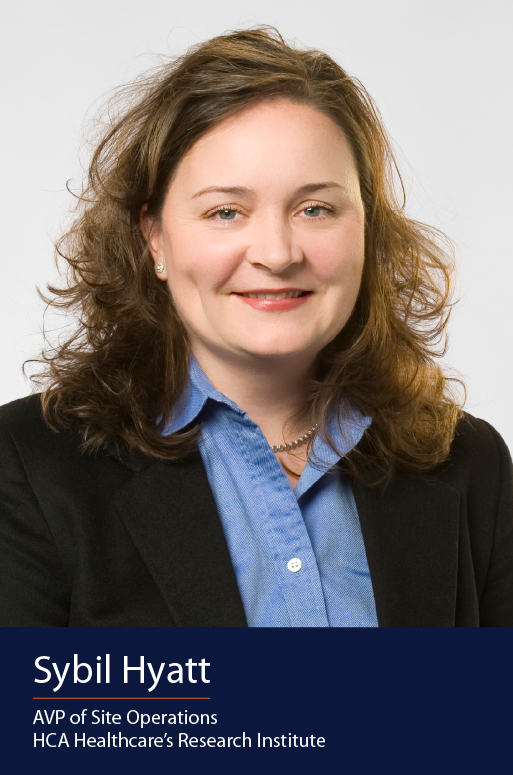(Part 2)
This is the second story in a two-part series. You can read the first story here.


(Part 2)
This is the second story in a two-part series. You can read the first story here.
HCA Healthcare’s commitment to continuous improvement is reflected in the pioneering clinical trials taking place across our organization.

Every 34 seconds, one person in the United States dies from heart disease. And even if it isn’t fatal, 25% of Americans will have at least one episode of atrial fibrillation, the most common type of heart arrhythmia. When cardiac patients experience AFib, their heart’s upper chambers beat quickly and irregularly, which disrupts the normal blood flow through the heart.
John Day, MD, a cardiac electrophysiologist at St. Mark’s Hospital in Salt Lake City, Utah, and physician executive of HCA Healthcare’s Mountain Division Cardiovascular Program, explains how dangerous AFib can be. “You have complete electrical chaos of the two upper chambers of the heart,” he says. In addition to symptoms like chest pain, palpitations, dizziness, lightheadedness and panting, AFib increases your risk of stroke and doubles your risk of heart failure and dementia.
Cardiac patients have recently found hope in the emerging field of pulsed field ablation, which, unlike past treatments, specifically targets defective heart tissue. “Pulsed field ablation saves the rest of the tissue,” says Dr. Day. “This is groundbreaking, transformative new technology for treating atrial fibrillation.”
Before it could be brought to the public, the technology behind pulse-field ablation required clinical trials. “The more patients you have, the more opportunity to treat AFib, and the more opportunity to introduce cutting-edge technology through clinical trials,” says Dr. Day.
Fortunately, HCA Healthcare’s expertise and scale allowed the organization to conduct four trials — at St. Mark’s in Utah and throughout the enterprise.

The administration at St. Mark’s Hospital in Salt Lake City, Utah, along with the EP lab team, celebrates their 1,000th pulsed-field ablation.
For the groundbreaking ADVENT clinical trial, Dr. Day served on the panel of review referees. The trial’s results were published in The New England Journal of Medicine’s 2023 report.
“Success rates are far higher than what we were seeing before,” says Dr. Day. “With the older technology, at least one in four patients needed a redo procedure, or about 25%. So far, with pulsed field ablation, only 5% of our patients have required a repeat procedure.”
The study, which led to the FDA approval of the technique in early 2024, also reveals the potential scope of clinical trials within HCA Healthcare. Of the 20 authors of the ADVENT trial, four were affiliated with HCA Healthcare:
Additionally, Dr. Day and St. Mark’s Hospital are involved in three other AFib studies.
ReMATCH trial
The ReMATCH trial is looking at patients who underwent an atrial fibrillation ablation using older technology that failed. “Now with pulsed field ablation, can we make it work?” asks Dr. Day, who serves on the study’s steering committee along with Dr. Cuoco.
They’re exploring questions like: What is required to turn a previously failed ablation into a successful ablation utilizing improved technology? “We need to make sure that we talk about why pulsed field ablation is such a game-changer because then it makes all these clinical trials more relevant,” says Dr. Day
DISRUPT-AF trial
The DISRUPT-AF trial refers to the creation of an organized, centralized database. The goal is to treat 7,000 new patients with pulsed field ablation. This will help researchers better understand the characteristics of a successful ablation and to know how best to treat these patients with the new technology.
“We’ll be able to determine who’s getting the best results and what they are doing differently,” says Dr. Day. “So we’re looking for outliers, which could change the field in a very positive way.”
MANIFEST trial
Finally, the MANIFEST trial is looking at real-world safety outcomes from the initial experience of pulsed field ablation in the United States. The trial incorporates data collected from the nation’s largest AFib ablation centers and almost 20,000 patients.
St. Mark’s is one of the key contributors to the study’s data, which will be presented at the American Heart Association meeting this fall. Dr. Day is one of the study’s authors. “We hope that the MANIFEST study will show that pulsed field ablation is indeed a much faster, safer and more effective ablation approach.”

Clinical trials require a significant financial and time investment. In the case of cardiac issues, the follow-up might take place 10 years down the road. “That’s a big commitment,” says Sybil Hyatt, who serves as AVP of Site Operations for HCA Healthcare’s Research Institute.
Hyatt notes HCA Healthcare, as one of the nation’s largest healthcare networks, provides the stability to take on that obligation.
“We can demonstrate the largest data set in the entire country, just exclusively within our network. I think we’re up to 47 million patient encounters. We’re looking at large swaths of data of patients across multiple geographic areas.”
Aside from large facilities that have the infrastructure to perform trials internally, Hyatt says the Research Institute supports clinical trials in more than 40 HCA Healthcare facilities that don’t have the same bandwidth.
“We are a blend of hospitals,” says Hyatt. “We certainly have hospitals in large urban centers that are very sizable and take care of very sick patients, but we also have hospitals in communities where there aren’t academic programs, and [patients] don’t necessarily have to leave and go to a big city to have increased access to this kind of cutting-edge therapy.
“Our goal is to try to be efficient in the way in which we activate so that we can be early to enroll in trials and have a meaningful impact,” says Hyatt. “But it isn’t enough just to enroll. You also have to have quality data. Because ultimately, the FDA is going to be requiring those sponsors to obtain the data they’re looking for to receive an approval.”
Hyatt emphasizes that the research provided through clinical trials is often required to maintain certifications in a number of areas, such as Level I trauma care or cancer treatment. Furthermore, investing in clinical trials also helps attract physicians interested in pursuing research as well as their surgical practices.
“It allows us to enhance our reputation,” says Hyatt. “As a private healthcare system, we use the term ‘privatemia’ because it’s a blend between private healthcare and academia, from a research perspective, bringing the best of both worlds together.”
We are a blend of hospitals. We certainly have hospitals in large urban centers that are very sizable and take care of very sick patients, but we also have hospitals in communities where there aren’t academic programs, and [patients] don’t necessarily have to leave and go to a big city to have increased access to this kind of cutting-edge therapy.— Sybil Hyatt, AVP of Site Operations, HCA Healthcare’s Research Institute